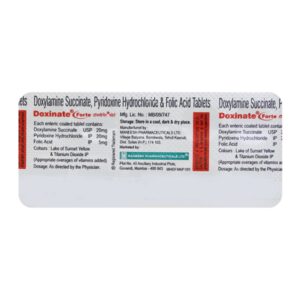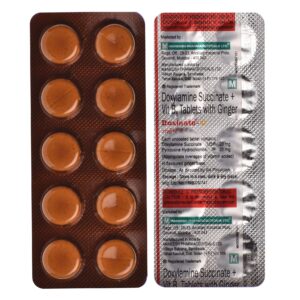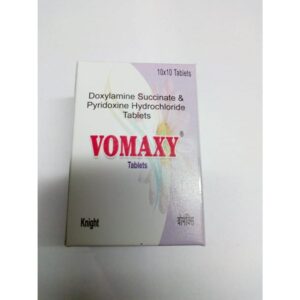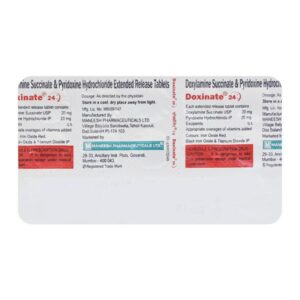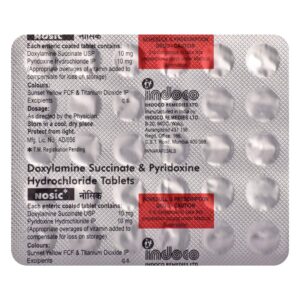PYRIDOXINE (VITAMIN B6) + DOXYLAMINE
Pyridoxine (vitamin B6): Pyridoxine, also known as vitamin B6, is a water-soluble vitamin that is essential for various bodily functions. It is naturally present in many foods, including fish, poultry, nuts, and vegetables.
Use:
Pyridoxine is primarily used as a dietary supplement to treat or prevent vitamin B6 deficiency. It is also prescribed for a range of medical conditions, such as:
1. Treatment of certain types of anemia.
2. Management of nausea and vomiting during pregnancy.
3. Aid in the treatment of certain neurological disorders, including peripheral neuropathy and pyridoxine-dependent seizures.
4. Support for patients with kidney disease who are undergoing dialysis.
Mechanism of Action:
Pyridoxine acts as a cofactor in various enzymatic reactions involved in amino acid metabolism, neurotransmitter synthesis (such as serotonin, dopamine, and GABA), and glycogenolysis. It is also essential for the proper functioning of the nervous system.
Dose:
The recommended daily dose of pyridoxine varies depending on the age, sex, and specific medical condition being treated. For most adults, the recommended daily dose ranges from 1.3 to 2 mg. However, higher doses may be required for certain medical conditions under the supervision of a healthcare professional.
Side Effects:
Pyridoxine is generally well-tolerated when taken at the recommended doses. However, high doses or long-term use of pyridoxine supplements may cause neurological side effects, including sensory neuropathy (tingling or numbness in the extremities), ataxia, and impaired walking ability. These side effects are more likely to occur when taking daily doses exceeding 200 mg.
In some cases, pyridoxine supplementation may also cause gastrointestinal symptoms such as nausea, vomiting, stomach pain, and loss of appetite. Allergic reactions to pyridoxine are rare but can occur.
It is essential to consult with a healthcare professional before starting pyridoxine supplementation, especially if you have any underlying medical conditions or are taking other medications, as they may interact with pyridoxine.
Doxylamine: Doxylamine is an antihistamine drug that is commonly used for the treatment of allergies and as a sleep aid. It is sold over-the-counter and by prescription under various brand names.
The primary mechanism of action of doxylamine is its ability to antagonize or block the effects of histamine in the body. Histamine is a natural compound that is involved in various allergic reactions and contributes to the symptoms of allergies, such as sneezing, itching, and watery eyes. By blocking the effects of histamine, doxylamine helps to relieve these symptoms.
As a sleep aid, doxylamine works by causing sedation and drowsiness. It acts on the central nervous system by targeting certain brain receptors, such as the H1 receptor, which play a role in promoting wakefulness. By blocking these receptors, doxylamine helps to induce sleep and can be helpful for those struggling with insomnia or difficulty falling asleep.
The typical recommended dose of doxylamine for both allergies and as a sleep aid is 10 to 25 mg taken orally before bed. However, it is important to follow the specific dosage instructions provided by the healthcare professional or indicated on the packaging.
Common side effects of doxylamine can include drowsiness, dry mouth, blurred vision, constipation, and urinary retention. These side effects are usually mild and transient, but if they persist or worsen, it is advisable to consult a healthcare professional. It is also worth noting that doxylamine can cause significant drowsiness, especially in the first few hours after ingestion, so it is important to avoid activities that require alertness, such as driving or operating machinery, until the effects have worn off.
While doxylamine is generally considered safe for most people, it may not be suitable for individuals with certain medical conditions, such as narrow-angle glaucoma, certain urinary problems, or asthma. Additionally, it may interact with certain medications, such as sedatives, tranquilizers, or monoamine oxidase inhibitors (MAOIs), so it is important to inform your healthcare professional about all medications you are taking.
Overall, doxylamine is an antihistamine that is commonly used for the treatment of allergies and as a sleep aid. It works by blocking histamine effects and promoting sedation to relieve symptoms and facilitate sleep. However, it is important to use this medication as directed and consult a healthcare professional if you have any concerns or questions.

